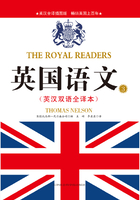
第3章 THE TEA-FARMER 茶农
ONCE upon a time there was no tea at all in our country. In England, in the olden time, people used to drink ale, and a sweet kind of wine called mead. Great tankards of ale stood on the breakfast table. Now we use tea and coffee.
When tea was first brought to England, an old man and woman had some sent to them as a great treat. But when they got it, they did not know how it ought to be used. At length they boiled the leaves, and strewed them on a piece of bacon which they were going to have for dinner. They ate the leaves, and threw the tea away!
In those days, a pound of tea cost so much money that only the rich could buy it. Now it is so cheap that even the poorest can enjoy it.
Tea is the leaf of a plant which grows plentifully in China, Japan, and other Eastern lands. The Chinese drink their tea without either milk or sugar. Whenever a visitor comes into a house, a servant always brings him a cup of tea.
Every cottager in China has his little tea-garden. He sells what he does not use, and can thus buy food and clothing for his family.
When a man has a large piece of ground, and grows a great many tea-plants, he is called a tea farmer. When the tea-leaves are ready to be gathered, the farmer and his family are very busy. They pull off the leaves and throw them into baskets. When the baskets are full, they are carried into the house.
The leaves are dried in iron pans over a fire. While they are drying, men and women keep turning them about. As soon as they begin to crack, they are taken out and spread upon a table. Then the work-people roll them up in their hands, and press all the juice they can out of them.
After being once more dried in the air, the leaves have to go into the pan again over the fire. There they begin to curl and twist; and at last they look as we see them in this country.
The farmer then picks out the best leaves, and gets them ready for market. He may be seen marching off to the town, with his chest of tea slung over his shoulder, on a pole made of bamboo.
He goes to a tea merchant and offers the chest of tea for sale. The merchant looks at it, and if he thinks it good he buys it. Then the farmer marches home again, with his money slung over his shoulder. His money consists of a number of strings of brass coins, of so little value that a great many of them make but a small sum.
Questions
What was used in England for breakfast before tea and coffee were known? What mistake did an old man and woman make, when tea first came in? What is tea? Where does it come from? What is a man called who grows a great many tea-plants? What is the first thing done with the leaves when they are pulled? What next? and next? How does the grower carry his tea to market? What does he bring back?
Pronunciation
cot'-ta-ger vis'-it-or en-joy' val'-ue march'-es
shoul'-der bas'-kets dry'-ing East'-ern mar'-ket
break'-fast fam'-i-ly con-sists' when-ev'-er read'-y
Write
boiled enjoy bamboo
length strewed shoulder
tankards cottager merchant
很久以前,我们国家根本没有茶叶这种东西。古代的英格兰人喝的是啤酒以及一种味道甜甜的蜂蜜酒。那时候,大大的啤酒杯会放在早餐桌上。但是现在,我们早餐桌上的饮料换成了茶和咖啡。
茶刚刚被带到英国的时候,有人把它送给一对老年夫妇作为珍贵的礼物。但是这对夫妇拿到这些茶的时候,却不知道怎么享用。最后,他们把茶的叶子煮了,然后把叶子洒在一片他们晚餐吃的培根上。他们把茶的叶子吃了,然后把茶水给倒了!
那个时候,一磅茶非常的贵,只有富人买得起。但是现在茶却非常便宜,即使是最贫穷的人也可以享用。
茶是一种植物的叶子,这种植物在中国、日本和其他东方国家有很多。中国人喝茶不加牛奶或糖。每当有客人来的时候,佣人都会为他端上一杯茶。
在中国,每个农民都会拥有自己的一个小茶园。他把自己不需要的茶叶卖掉,然后为家人购买食物和衣服。
当人们有一大块地,可以种植许多茶树的时候,他们就被称为茶农了。茶叶到了可以采摘的时节,茶农和他的家人就会忙碌起来。他们把茶树的叶子摘下来,扔进筐里。当筐满的时候,他们就把叶子搬进屋里。
叶子在铁锅里被火烘干。在烘干的过程中,人们不停地翻转茶叶。茶叶一发出噼啪声,人们就立即把它取出,平摊在桌上。然后再用手揉捻茶叶,尽力把其中的汁液挤出。
在空气中又经过一番干燥之后,叶子需要再次放入锅中用火烘干。这时茶叶开始卷曲、变弯,最后变成在我们国家看到的茶叶的样子。
之后,茶农把最好的茶叶分拣出来,准备到市场上卖掉。茶农会挑着一根扁担,扁担上挂着装茶的箱子,向镇子出发。
他到茶叶商人那里,把那箱茶叶卖掉。商人打量着这些茶,像在思考买这些茶应该比较合算。然后,茶农又踏上了回家的路。这时他肩头挑着的是卖茶赚来的几串铜钱。铜钱价值不高,所以虽然看起来不少,但实际并不值多少钱。